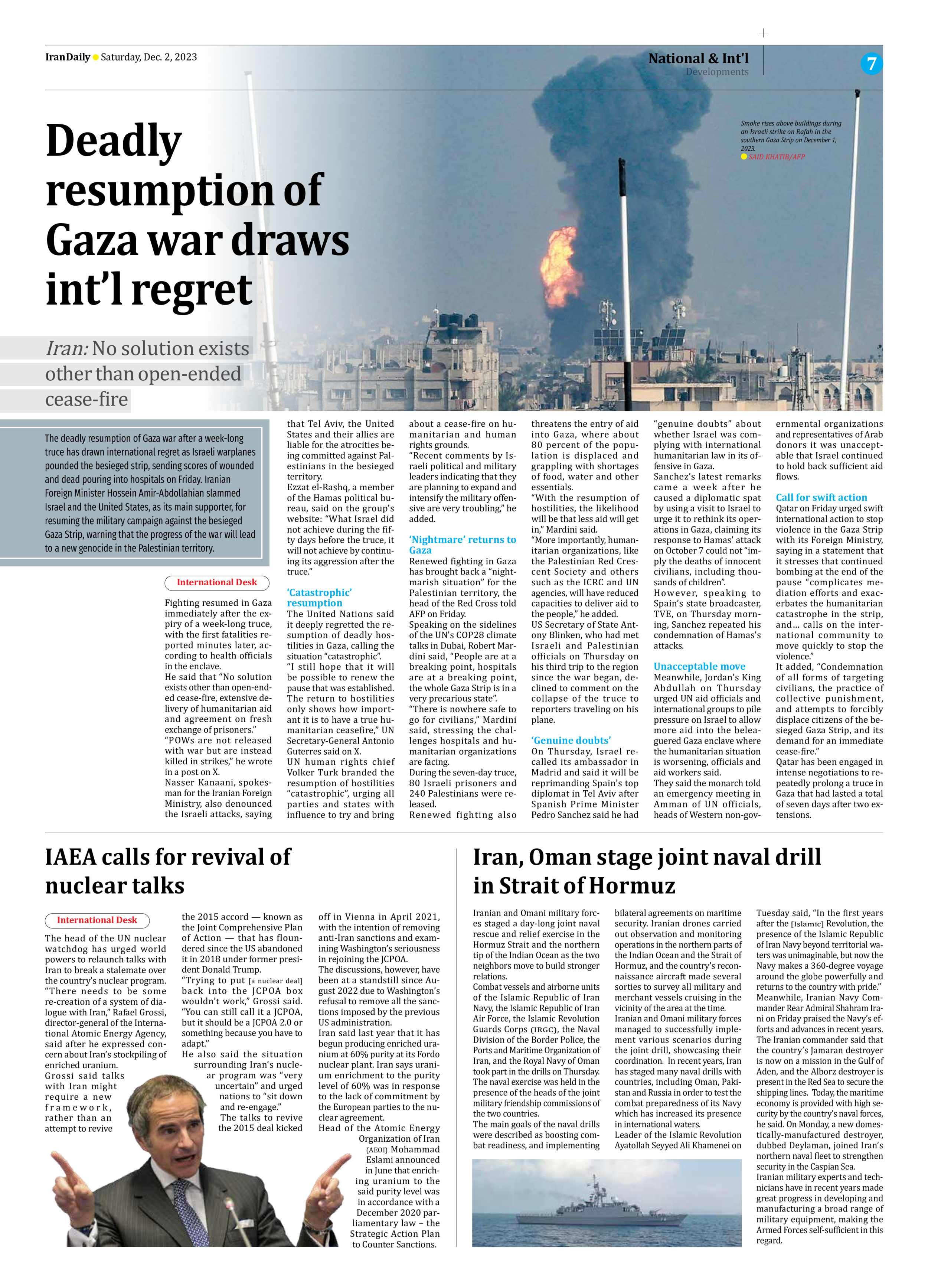
Deadly resumption of Gaza war draws int’l regret
Iran: No solution exists other than open-ended cease-fire
The deadly resumption of Gaza war after a week-long truce has drawn international regret as Israeli warplanes pounded the besieged strip, sending scores of wounded and dead pouring into hospitals on Friday. Iranian Foreign Minister Hossein Amir-Abdollahian slammed Israel and the United States, as its main supporter, for resuming the military campaign against the besieged Gaza Strip, warning that the progress of the war will lead to a new genocide in the Palestinian territory.
Fighting resumed in Gaza immediately after the expiry of a week-long truce, with the first fatalities reported minutes later, according to health officials in the enclave.
He said that “No solution exists other than open-ended cease-fire, extensive delivery of humanitarian aid and agreement on fresh exchange of prisoners.”
“POWs are not released with war but are instead killed in strikes,” he wrote in a post on X.
Nasser Kanaani, spokesman for the Iranian Foreign Ministry, also denounced the Israeli attacks, saying that Tel Aviv, the United States and their allies are liable for the atrocities being committed against Palestinians in the besieged territory.
Ezzat el-Rashq, a member of the Hamas political bureau, said on the group’s website: “What Israel did not achieve during the fifty days before the truce, it will not achieve by continuing its aggression after the truce.”
‘Catastrophic’
resumption
The United Nations said it deeply regretted the resumption of deadly hostilities in Gaza, calling the situation “catastrophic”.
“I still hope that it will be possible to renew the pause that was established. The return to hostilities only shows how important it is to have a true humanitarian ceasefire,” UN Secretary-General Antonio Guterres said on X.
UN human rights chief Volker Turk branded the resumption of hostilities “catastrophic”, urging all parties and states with influence to try and bring about a cease-fire on humanitarian and human rights grounds.
“Recent comments by Israeli political and military leaders indicating that they are planning to expand and intensify the military offensive are very troubling,” he added.
‘Nightmare’ returns to Gaza
Renewed fighting in Gaza has brought back a “nightmarish situation” for the Palestinian territory, the head of the Red Cross told AFP on Friday.
Speaking on the sidelines of the UN’s COP28 climate talks in Dubai, Robert Mardini said, “People are at a breaking point, hospitals are at a breaking point, the whole Gaza Strip is in a very precarious state”.
“There is nowhere safe to go for civilians,” Mardini said, stressing the challenges hospitals and humanitarian organizations are facing.
During the seven-day truce, 80 Israeli prisoners and 240 Palestinians were released.
Renewed fighting also threatens the entry of aid into Gaza, where about 80 percent of the population is displaced and grappling with shortages of food, water and other
essentials.
“With the resumption of hostilities, the likelihood will be that less aid will get in,” Mardini said.
“More importantly, humanitarian organizations, like the Palestinian Red Crescent Society and others such as the ICRC and UN agencies, will have reduced capacities to deliver aid to the people,” he added.
US Secretary of State Antony Blinken, who had met Israeli and Palestinian officials on Thursday on his third trip to the region since the war began, declined to comment on the collapse of the truce to reporters traveling on his plane.
‘Genuine doubts’
On Thursday, Israel recalled its ambassador in Madrid and said it will be reprimanding Spain’s top diplomat in Tel Aviv after Spanish Prime Minister Pedro Sanchez said he had “genuine doubts” about whether Israel was complying with international humanitarian law in its offensive in Gaza.
Sanchez’s latest remarks came a week after he caused a diplomatic spat by using a visit to Israel to urge it to rethink its operations in Gaza, claiming its response to Hamas’ attack on October 7 could not “imply the deaths of innocent civilians, including thousands of children”.
However, speaking to Spain’s state broadcaster, TVE, on Thursday morning, Sanchez repeated his condemnation of Hamas’s attacks.
Unacceptable move
Meanwhile, Jordan’s King Abdullah on Thursday urged UN aid officials and international groups to pile pressure on Israel to allow more aid into the beleaguered Gaza enclave where the humanitarian situation is worsening, officials and aid workers said.
They said the monarch told an emergency meeting in Amman of UN officials, heads of Western non-governmental organizations and representatives of Arab donors it was unacceptable that Israel continued to hold back sufficient aid flows.
Call for swift action
Qatar on Friday urged swift international action to stop violence in the Gaza Strip with its Foreign Ministry, saying in a statement that it stresses that continued bombing at the end of the pause “complicates mediation efforts and exacerbates the humanitarian catastrophe in the strip, and… calls on the international community to move quickly to stop the
violence.”
It added, “Condemnation of all forms of targeting civilians, the practice of collective punishment, and attempts to forcibly displace citizens of the besieged Gaza Strip, and its demand for an immediate cease-fire.”
Qatar has been engaged in intense negotiations to repeatedly prolong a truce in Gaza that had lasted a total of seven days after two extensions.







